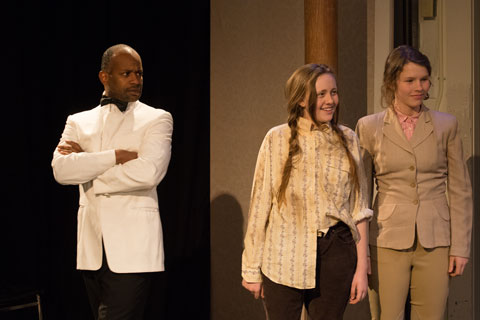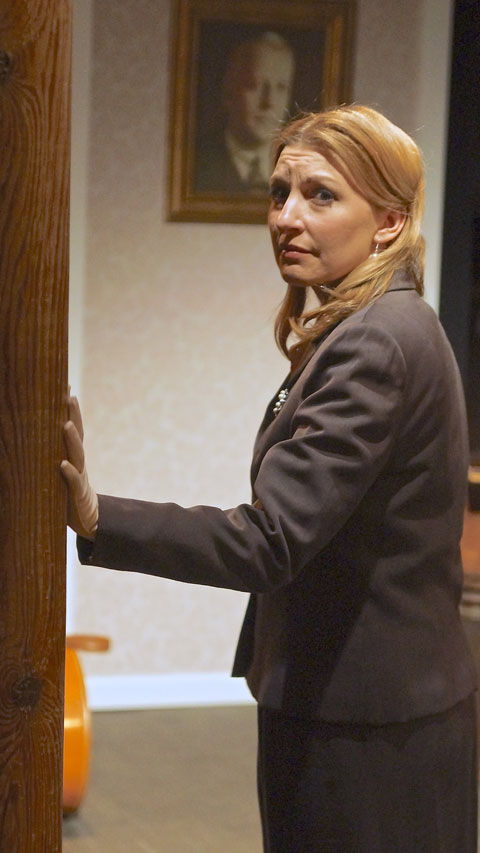 Thomas Smallwood (Brooks, Sr. Brooks, Jr.), Rose Cannon (Lee Bouvier), and Blair Carpenter (Jacqueline Bouvier). |
Grey Gardens, Albert and David Maysles’ disquieting documentary about Edie Bouvier Beale and her daughter Edie, an aunt and first cousin of Jackie Bouvier Onassis who plunge from the American aristocracy to flea-infested decrepitude, has fascinated since its premiere in 1975. Its iconic subjects are constantly breaking into the songs of their glory days, and in 2006, their story was reshaped in the classic American form of musical theater. Ray Marc Dumont directs a taut, colorful, riveting production for Mad Horse Theatre Company, starring Christine Louise Marshall, Susan Reilly, and Anna Gravel as the mother and daughter about whom a newsman’s voice intones, as introduction over keyboard glissandos, “How could American royalty fall so far so fast?”

Anna Gravel as Little Edie in Mad Horse's Grey Gardens. |
The Maysles’ documentary presents the Beales in claustrophobic impoverishment in East Hampton as they — and they alone — tell their own stories; we are left to queasily speculate on the How and Why of their decline. The musical, in contrast, does speculate: It zooms out on the timeline to imagine Big Edie and Little Edie, as they became known, not just in their 1970s squalor but in 1941, when they’re still part of the American elite. Thus, we witness outright the contrast that time wreaks, and, in a clever device, the musical young Big Edie and old Little Edie are both played by the same actress (Marshall, who is excellent), to amplify the nature and influences of her transformation.
In the first half of the show, the household ensemble and band (an agile trio of woodwinds, percussion, and keyboard) expertly weave Grey Gardens’ earlier ethos of ease, privilege, and garden parties. Lovely young socialite and model Little Edie (Gravel, as bright and graceful as light) is readying for a party to celebrate her engagement party to Joe Kennedy, Jr. (the Phoenix’s Nicholas Schroeder, with breezy arrogance). But attention-hungry chanteuse Big Edie has planned to sing rather a lot, to the dismay of her daughter and the rage of her father “Major” Bouvier (Tony Reilly, all contempt and entitlement), who believes that “the hallmark of aristocracy is responsibility” and considers Big Edie’s cocktail-swilling live-in composer Gould (David Jon Timm, campily dissolute) a “perversion.” As the sparks fly, Marshall does fine work navigating Big Edie’s haughtiness, exuberance, and hurt, while Gravel opens up Little Edie’s anger, insecurities, and love slowly, with beautiful sensitivity. Together, Marshall and Gravel convey the mother and daughter’s defining cycle of affection, attack, and reconciliation with great compassion.
The second half brings us into the women’s intense co-dependence and claustrophobic squalor — towers of cat food cans, filthy bedclothes, Big Edie’s bed on the platform where earlier she posed to perform (Scott Leland’s striking design flips the house on its head from one act to the other). Reilly’s bedridden Big Edie makes the skin prickle as she preens for neighborhood boy Jerry (Schroeder) and both women are disturbing as they regress and compete like young sisters. Marshall’s channeling of the Little Edie of the film — especially her voice, at once brash, theatrical, and cultivated — is uncanny. In her Little Edie’s smile we see an unnerving version of what we saw in the smile of Gravel’s younger Edie — that quick, wide bolt of bright, eager-to-charm light.